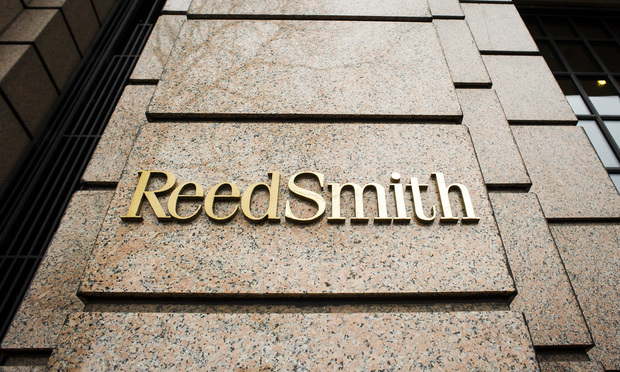Reed Smith Enters the Legal Technology Market With GravityStack Subsidiary
The firm's new U.S. subsidiary will incubate and license legal technology, as well as offer tech counseling and managed services to law firm and legal department clients.
April 24, 2018 at 01:11 PM
5 minute read
The original version of this story was published on Legal Tech News
 Photo Credit: Diego M. Radzinschi/ALM
Photo Credit: Diego M. Radzinschi/ALM Joining a growing number of law firms entering the tech business, Reed Smith announced the launch of GravityStack, a spin-off subsidiary technology group that will create and license the firms' technology products and provide managed services to law firm and legal department clients.
Bryon Bratcher, head of practice support at Reed Smith and now the managing director of GravityStack, described the new U.S.-based subsidiary as a “data-driven technology group trying to tackle some of the challenges that come up both in litigation transactions and compliance areas of law.”
The new subsidiary, which is wholly owned by Reed Smith, will act as an internal development incubator for new legal technology that it will design, test and license out to legal clients. GravityStack, though, will operate in a few others areas as well. “One is legal technology and systems counseling,” Bratcher said, noting that the group will help clients analyze their data and recommended, implement and optimize legal technology systems.
GravityStack will also offer deployments of teams of data scientists and developers to help clients manage their structured and unstructured data, to enable them to “gain insights that they may not have already known about in their business, or giving them a more defensible positioning,” Bratcher added.
What's more, the group will have a managed legal services operation that will focus on a wide range of services, including “litigation e-discovery, managed transactional contract support, virtual deal rooms, and due diligence risk analysis,” Bratcher said.
As a part of the GravityStack's launch, Reed Smith also announced it will be licensing its e-discovery analytics and business intelligence tool Periscope through the new subsidiary. Periscope, which was created by the firm in 2014, has been internally used at Reed Smith to help clients manage e-discovery spend and efficiency.
Bratcher described Periscope as “basically a data warehouse” that sits on top of the Relativity e-discovery platform to track “the speed and accuracy of document reviewers at the individual level.” In addition, Periscope can also connect with a firm's financial system to track e-discovery project spend, and connect with data processing software to measure and track the size of cases.
By aggregating and analyzing all the data the platform collects, “we can now identify any reviewer that has ever touched our systems over the past few years, the various bureaus, the various firms, the various outside providers, and we can match the best ones to the specific type of cases,” Bratcher said.
The impetus to launch GravityStack came in large part because Reed Smith's clients expressed a desire for a “one-stop-shop” legal services company. Clients told the firm that while there are legal technology companies, legal consulting groups and law firms they rely on, “there is nothing that really harnesses all three of those together,” Bratcher said.
“So GravityStack is really formed as tying to be a polarizing force that brings all those things together—the technology, the business process, and also the legal expertise from Reed Smith as a partner—to deliver a collective intelligence of law,” he added.
To be sure, Reed Smith is far from the only law firm entering the legal technology business. Global law firms Dentons' Nextlaw subsidiaries, for instance, allows it to invest in new legal technology startups and solutions. There are also firms like U.K.-based firms TLT and Slaughter and May that have invested directly in legal technology companies, and in TLT's case, acted at their licensor as well.
Meanwhile, firms like Robins Kaplan and Perkins Coie, have developed internal legal tech solutions around certain practices area like intellectual property and patents that they offer exclusively to their clients.
Reed Smith has been active in promoting and developing legal technology before it created GravityStack. The law firm has recently launched a tech program for summer associates, a data breach notification assessment app, and took a stake in artificial intelligence contract review platform Heretik, which it has a hand in developing.
The launch of GravityStack was a recognition by the firm that “the legal market is certainly changing and has been changing and there is much more demand for operational efficiency,” Bratcher said. “Reed Smith knows that legal expertise is king for our clients, they need that, but now there's sort of this whole redefinition of value, the need [to] be operational efficient in the delivery of [legal services].”
He added that the shift in the market poses an existential pitfall for legal companies not willing or able to adapt. “If law firms aren't at least thinking in this way, to be at operationally efficient, they could be in trouble down the road, because our clients are certainly demanding that.”
This content has been archived. It is available through our partners, LexisNexis® and Bloomberg Law.
To view this content, please continue to their sites.
Not a Lexis Subscriber?
Subscribe Now
Not a Bloomberg Law Subscriber?
Subscribe Now
NOT FOR REPRINT
© 2025 ALM Global, LLC, All Rights Reserved. Request academic re-use from www.copyright.com. All other uses, submit a request to [email protected]. For more information visit Asset & Logo Licensing.
You Might Like
View All
AI's Place in Big Law Broadens, As Firms Embrace Fresh Uses of the Technology

Arizona Board Gives Thumbs Up to KPMG's Bid To Deliver Legal Services

Epiq Announces AI Discovery Assistant, Initially Developed by Laer AI, With Help From Sullivan & Cromwell
5 minute readTrending Stories
- 1White & Case KOs Claims Against Voltage Inc. in Solar Companies' Trade Dispute
- 2Avantia Publicly Announces Agentic AI Platform Ava
- 3Shifting Sands: May a Court Properly Order the Sale of the Marital Residence During a Divorce’s Pendency?
- 4Joint Custody Awards in New York – The Current Rule
- 5Paul Hastings, Recruiting From Davis Polk, Adds Capital Markets Attorney
Who Got The Work
J. Brugh Lower of Gibbons has entered an appearance for industrial equipment supplier Devco Corporation in a pending trademark infringement lawsuit. The suit, accusing the defendant of selling knock-off Graco products, was filed Dec. 18 in New Jersey District Court by Rivkin Radler on behalf of Graco Inc. and Graco Minnesota. The case, assigned to U.S. District Judge Zahid N. Quraishi, is 3:24-cv-11294, Graco Inc. et al v. Devco Corporation.
Who Got The Work
Rebecca Maller-Stein and Kent A. Yalowitz of Arnold & Porter Kaye Scholer have entered their appearances for Hanaco Venture Capital and its executives, Lior Prosor and David Frankel, in a pending securities lawsuit. The action, filed on Dec. 24 in New York Southern District Court by Zell, Aron & Co. on behalf of Goldeneye Advisors, accuses the defendants of negligently and fraudulently managing the plaintiff's $1 million investment. The case, assigned to U.S. District Judge Vernon S. Broderick, is 1:24-cv-09918, Goldeneye Advisors, LLC v. Hanaco Venture Capital, Ltd. et al.
Who Got The Work
Attorneys from A&O Shearman has stepped in as defense counsel for Toronto-Dominion Bank and other defendants in a pending securities class action. The suit, filed Dec. 11 in New York Southern District Court by Bleichmar Fonti & Auld, accuses the defendants of concealing the bank's 'pervasive' deficiencies in regards to its compliance with the Bank Secrecy Act and the quality of its anti-money laundering controls. The case, assigned to U.S. District Judge Arun Subramanian, is 1:24-cv-09445, Gonzalez v. The Toronto-Dominion Bank et al.
Who Got The Work
Crown Castle International, a Pennsylvania company providing shared communications infrastructure, has turned to Luke D. Wolf of Gordon Rees Scully Mansukhani to fend off a pending breach-of-contract lawsuit. The court action, filed Nov. 25 in Michigan Eastern District Court by Hooper Hathaway PC on behalf of The Town Residences LLC, accuses Crown Castle of failing to transfer approximately $30,000 in utility payments from T-Mobile in breach of a roof-top lease and assignment agreement. The case, assigned to U.S. District Judge Susan K. Declercq, is 2:24-cv-13131, The Town Residences LLC v. T-Mobile US, Inc. et al.
Who Got The Work
Wilfred P. Coronato and Daniel M. Schwartz of McCarter & English have stepped in as defense counsel to Electrolux Home Products Inc. in a pending product liability lawsuit. The court action, filed Nov. 26 in New York Eastern District Court by Poulos Lopiccolo PC and Nagel Rice LLP on behalf of David Stern, alleges that the defendant's refrigerators’ drawers and shelving repeatedly break and fall apart within months after purchase. The case, assigned to U.S. District Judge Joan M. Azrack, is 2:24-cv-08204, Stern v. Electrolux Home Products, Inc.
Featured Firms
Law Offices of Gary Martin Hays & Associates, P.C.
(470) 294-1674
Law Offices of Mark E. Salomone
(857) 444-6468
Smith & Hassler
(713) 739-1250










